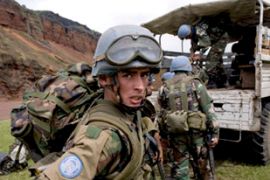UN says peacekeepers overstretched
US official says mission failure will have terrible consequences for the world body.

“United Nations peacekeeping is clearly overstretched. We face operational overstretch and, I would argue, political overstretch too.”
Unclear mandate
In the Democratic Republic of Congo (DRC), the UN has deployed more than 18,000 security personnel to control a number of continuing conflicts.
When a quarter of a million people fled fighting in the DRC last September, the UN peacekeepers that were there to protect them did little more than watch.
|
“If some countries stay away from peacekeeping, don’t want to wear the blue helmets, it sends a signal that they are not fully engaged” Jean-Marie Guehenno, former UN under-secretary-general for peacekeeping operations |
UN commanders in DR Congo said they needed more troops and a clearer mandate, but four months later, additional forces have yet to arrive.
The largest deployment of UN security forces, however, is in Sudan. More than 25,000 peacekeepers are in the country on two separate missions: one to keep the peace after the Sudanese civil war ended in 2005, and the other to try to stabilise the conflict in Darfur.
The Security Council has launched a review of all its peacekeeping operations.
Susan Rice, the new US ambassador to the UN, says some operations may need to be reconsidered, in particular, a proposed mission to Somalia.
“I am sceptical … about the wisdom of a United Nations peacekeeping force in Somalia at this time,” Rice said. “The new administration will have to take a very careful and close look at whether in six months time to, in fact, support the standing up of a UN force.”
‘Not fully engaged’
The US contributes more money to UN peacekeeping operations than any other country, but it provides next to nothing in the way of troops.
Instead, the majority of UN peacekeepers come from the developing world often leaving the least advance militaries to police increasingly complex conflict zones.
Pakistan is the largest single contributor to UN peacekeeping forces globally, with more than 11,000 nationals serving.
Bangladesh follows, contributing 9,500 forces, India is third with more than 8,000, and Nigeria is fourth with almost 6,000.
The US is 67th on the list, contributing just 91 personnel.
Jean-Marie Guehenno, the former under-secretary-general for peacekeeping operations, said he believed powerful countries need to share the risks in addition to the costs.
“If some countries stay away from peacekeeping, don’t want to wear the blue helmets, it sends a signal that they are not fully engaged,” he said.
Resource problems
But some countries say the problem is simply allocation of resources.
“Missions are getting increasingly more complex, more demanding, and with more and more of them involving more and more troops, then there are capacity constraints, both in terms of numbers of troops available and in the budget,” John Sawyers, the UK ambassador to the UN, said.
“UN peacekeeping is not in crisis,” he said, but is rather, “to some extent a victim of its own success”.
“Missions are getting increasingly more complex, more demanding, and with more and more of them involving more and more troops, then there are capacity constraints, both in terms of numbers of troops available and in the budget.”
Reporting from the UN heaquarters in New York, Al Jazeera’s Kristen Saloomey said that “everyone seems to agree that change is necessary [but] like almost everything at the UN, it is likely to take a while”.
The Security Council plans to take a year to investigate the matter before coming up with recommendations.